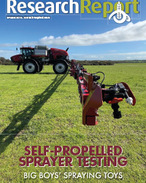This article is 8 years old. Images might not display.
Field peas are typically sown late in the growing season, mainly due to the risk of fungal diseases, however early sown field peas have shown potential for increased yields.
An estimated 25,000 hectares of field peas were sown in Western Australia in 2016, mainly on the South Coast, and the WA Department of Agriculture and Food has commenced a new research project to overcome constraints to sowing early in an attempt to lift yields by 15 per cent.
The research is one of a suite of 11 Grains Flagship projects, which are part of the department’s $20 million Boosting Grains Research and Development initiative, made possible by Royalties for Regions.
Research officer Ron Yates said one of the keys to successful early sown field peas would be to identify a robust rhizobium, symbiotic bacteria found in nodules on the plant roots that aid nitrogen fixation.
With early sowing opportunities not possible last year, Dr Yates concentrated his research on assessing how herbicide and foliar fungicide treatments affected nodulation, nitrogen fixation and yield on field peas.
“Effective weed control is essential if field peas are to be sown earlier in the season,” he said.
“A successful field pea crop is particularly reliant on pre-emergent herbicides, so it is important that the project evaluates suitable and effective sprays that don’t lead to yield loss.”
Research trials planted at Grass Patch and Wittenoom Hills, Katanning and Nyabing in 2016 were sown with Wharton or Gunyah field peas and treated with various herbicides, fungicides and rhizobium inoculants.
“Preliminary findings suggest that Imidazolinone herbicides had less of an impact on the N fixation and yield of the field peas than Trifluralin and Terbuthylazine,” Dr Yates said.
“The trials also showed fungal foliar sprays did not affect N fixation, although their effectiveness in black spot control needs more research.”
However, the project scientists are very mindful that sowing early may elevate the frost risk in some regions.
The field trials will be reinforced by an economic cost-benefit analysis of the treatments, from which recommendations for early sown peas can be developed.
The department is collaborating with Murdoch University’s Centre for Rhizobium Studies and Curtin University’s Centre for Crop and Disease Management projects on the research, which will be completed by 2018.























